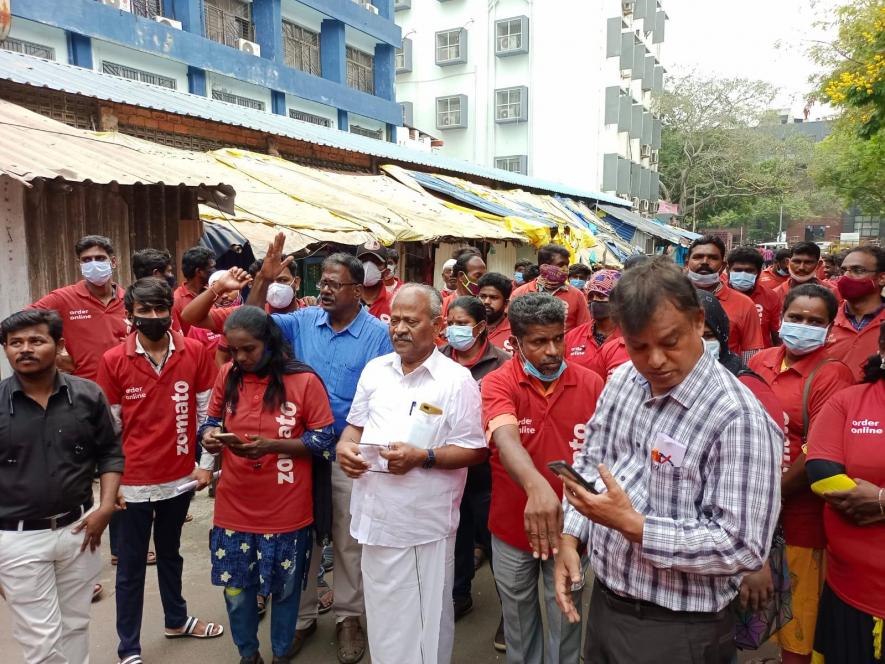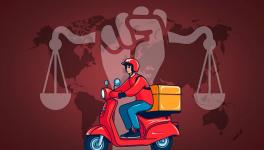TN: Zomato Delivery Partners Protest Exploitation, Demand Assured Pay and Social Welfare Measures

CITU state president A Soundarrajan addressed the protesting Zomato delivery partners in Chennai on March 20 (Courtesy: Jaffer Hussain)
The delivery partners of Zomato held a protest in Chennai on March 20 against increasing working hours, low wages and other forms of exploitation. With the abolition of the 'prime' category of delivery partners, the earnings of the workers have suffered a massive setback, while the increase in fuel prices also impact their income.
The workers demand social security and welfare measures, as the company has denied such measures by designating the workers as delivery partners. The company is accused of burdening the delivery partners and forcing them into literal slavery.
The protest was led by the Centre of Indian Trade Unions (CITU), in which around 100 workers participated despite threats from the company of being terminated. The workers demand permanent jobs, regulated working hours and social welfare measures.
PROTESTS AMIDST INTIMIDATION
After severe oppression and exploitation by the Zomato, the workers sought the help of CITU to hold a protest to register their opposition. The workers alleged that the police denied permission for the protest, while the company issued threats of their logins being blocked.
"The police made us wait for several hours and denied permission. Only after the CITU leaders intervened, permission was provided. Few authorities from the company called us and threatened of losing jobs if we participated in the protest," a worker seeking anonymity said.
"This shows the apathy of the government and the organisation towards such workers who remain unorganised and highly exploited by corporates taking advantage of the increasing unemployment across the country," C Thiruvettai, secretary of CITU, said.
'SEVERE EXPLOITATION CONTINUES'
The delivery partners, as the workers are designated by Zomato and other food delivery apps, accuse the organisation of massive exploitation.
"By calling us partners, the company denies basic social security measures including provident fund (PF) and employee state insurance (ESI). Since we are on the road for most parts of the day, our health gets severely affected. Such security measures can help us during a health emergency," a delivery partner working with Zomato for more than four years told NewsClick.
The workers also accused the organisation of increasing work pressure since the organisation has changed the policy on food pick-up and delivery.
Another worker accused the company of a lack of transparency on payment for the delivery partners.
"Earlier, we would be informed of the amount paid to us for each order. They inform us about the distance for picking up an order from a restaurant and delivery to the customer. The amount was paid for the distance covered for pick-up and delivery. Now only delivery charges are paid," he said.
The company is known for providing assurances on delivery within a stipulated time to earn credibility and market dominance.
"Such practices of timely delivery have become a threat to the delivery partners and others on the roads. Since they are penalised for late delivery, the partners tend to break the rules due to compulsion," Thiruvettai said.
The gig workers, an increasing section of the working class, remain outside the ambit of basic social welfare measures and job guarantees.
The policy of quick delivery also puts workers' lives at risk.
"Even if accidents happen during delivery, our fellow workers cannot stop by and help us since they fear incentive cuts and reduction in rating. This system has forced us to even care for others and run behind money. We demand the company to categorise us as workers instead of delivery partners so that we can get our rights," a delivery partner said.
'DEPRIVED OF BENEFITS POST COVID'
The workers also claimed that Zomato had discontinued the earlier policy of paying the delivery partners categorised as 'prime'. The partners who worked for 28 days in a month were paid special payments before the COVID-19 pandemic hit the country.
"Earlier the company paid us Rs 12,000 on attending 28 days of work every month. It was subsequently reduced to Rs 10,000 and then to Rs 8,000 for unknown reasons. The scheme itself was discontinued after March 2020 after the pandemic. We worked even during the pandemic but had no reward," a delivery partner said.
The company has announced a new system of delivering food items in 10 minutes and 30 minutes for selected items in selected cities. When asked about the outcome of such a policy, a worker asked, "Who decides this time limit without any consultations? This is another step towards putting our lives at risk."
The increasing fuel prices also eat into the earnings of the delivery partners.
"We ride on two-wheelers for more than 12-14 hours a day. Our health deteriorates while our income is reducing due to fuel prices and policies of the organisation. Only a strong trade union presence and united fight will win us our rights," a worker said.
Get the latest reports & analysis with people's perspective on Protests, movements & deep analytical videos, discussions of the current affairs in your Telegram app. Subscribe to NewsClick's Telegram channel & get Real-Time updates on stories, as they get published on our website.






















